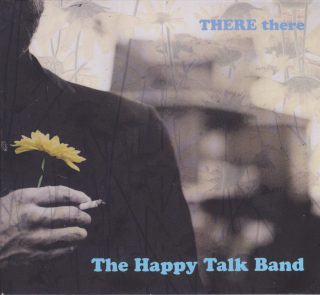
When Luke Allen came by to drop off a copy of There, There, his second CD with his longtime project the Happy Talk Band, he popped open the jewel case to read off a curious annotation of the dedications in the liner notes: 'Suicide, suicide, O.D. — which is basically suicide — O.D., murder, murder, suicide." It's not that Allen is necessarily a morbid guy " Happy Talk's 2003 album, Total Death Benefit, a unique alternative folk-rock collection of bitter love songs and boozy, self-conscious ballads, cemented him as a keen chronicler of downtown New Orleans bohemia. He's spent a good bit of the four years since as a bartender, serving drinks to the people he writes about on There, There. The thing that stands out the most on the album is the collection of memorial songs. 'Pete, Kelly, Bucky, Yvette down the street " Allen counts off. 'There's a little bit of everybody on there." Although Allen seems to be a speedy eulogist, he says the process isn't directly contingent on bad news. 'Sometimes I get a line here or there, and I write the song in pieces. And then the latest tragedy comes around, and I realize I've been writing about it all along." There, There takes place in the storm's physical and emotional wreckage, but when it evokes the fallout of the disaster, it does so on the most personal of scales. And sometimes its presence is only theoretical, as with 'Sometimes Sailors," the story of a friend who shot himself a week before the levees failed.
'He had floating bodies in his head," Allen muses, wondering what difference, if any, it would have made if he'd waited and seen them made real.
Happy Talk stage shows over the past few years have revealed a cautiously experimental band. Sometimes acoustic bass is replaced with electric and the songs are amped up to punk-rock levels. More often, with the addition of pedal steel, cello and, on the record, banjo played by producer Mark Bingham, Allen goes for a more understated complexity that buttresses his harsh voice (and sometimes harsher lyrics) nicely, revealing him as a shockingly good country stylist. 'I find I don't like blasting my voice over everyone all the time anymore," says Allen. 'I want to take my time and tell the story and make sure the story's heard." Total Death Benefit was also the inaugural release on a new local label, Gallatin Records, started by Mark Bingham and Shawn Hall, Happy Talk's manager, at Piety Street Studios. A solid plan for the label is still in the works, but Bingham says he's got plenty of stuff in the can.
'I'm sitting on a backlog," Bingham says. 'And I thought it might be fun to put out a big catalog of stuff I'd worked on with people in the neighborhood." Allen, who lives a block away from Piety Street, was a perfect start " Bingham also mixed Total Death Benefit and the band was eager to work with him as a producer.
The funereal tone of There, There stands out as the record's overarching theme. One of the finer tracks is 'May Day 1945," a disturbingly joyful murder ballad told from the standpoint of a cuckolded World War II veteran with a guitar line that careens crazily through the song, underscoring the narrator's macabre glee. He's a man, the guitar tells us, who's cheerfully relinquished sanity for something that, though it effectively dooms him, feels much better. The understated, mildly self-flagellating 'U.S. Out Of America" is an elegy not for a person, but for the fading of political conviction. The closing track, 'The Waiting Song" " a kind of allegorical ballad that's been part of Allen's show for more than five years " seems to be about the paradoxical pleasure and heartbreak of willful self-delusion.
The stories on There, There approach the subject more obliquely than on Total Death Benefit, where the joy of life on the margins ultimately won out over the nagging feeling that one should get one's act together. There, There, with a title that suggests " and mocks " the futility of comfort, creeps sideways toward a conclusion that's much more nuanced " and which isn't a conclusion, in the final sense, at all. Since the wreckage we feel inside is on the outside for everyone to see, what now?